 Petzlover
Petzlover Irish Water Spaniel is originated from Ireland but Large Munsterlander is originated from Germany. Irish Water Spaniel may grow 6 cm / 2 inches shorter than Large Munsterlander. Both Irish Water Spaniel and Large Munsterlander are having almost same weight. Both Irish Water Spaniel and Large Munsterlander has almost same life span. Both Irish Water Spaniel and Large Munsterlander has almost same litter size. Both Irish Water Spaniel and Large Munsterlander requires Moderate Maintenance.
Irish Water Spaniel is originated from Ireland but Large Munsterlander is originated from Germany. Irish Water Spaniel may grow 6 cm / 2 inches shorter than Large Munsterlander. Both Irish Water Spaniel and Large Munsterlander are having almost same weight. Both Irish Water Spaniel and Large Munsterlander has almost same life span. Both Irish Water Spaniel and Large Munsterlander has almost same litter size. Both Irish Water Spaniel and Large Munsterlander requires Moderate Maintenance.
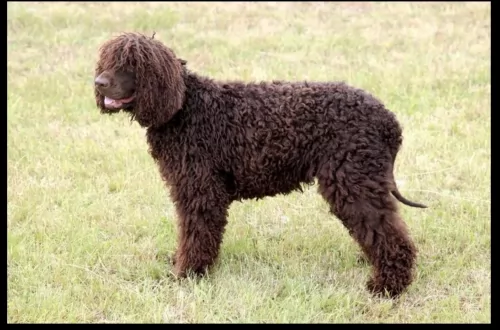 The Irish Water Spaniel is one of the larger spaniel types and also one of the oldest.
The Irish Water Spaniel is one of the larger spaniel types and also one of the oldest.
He is sometimes referred to as the Southern Irish Water Spaniel. Hailing from Ireland, the precise origins of the dog aren't altogether sure. It is believed that the dog came from other dogs from Persia and there are references to these water dogs from as early as 1600.
The modern breed was developed in Ireland in the 1830s. The breed's purpose is that of a hunter of waterfowl and he swims strongly.
The Irish Water Spaniel was recognized by the AKC in 1884. In 1890 the Irish Water Spaniel Club was formed.
 The Large Münsterländer hails from the Münster region in Germany. It was in 1919 that the first breed club was founded.
The Large Münsterländer hails from the Münster region in Germany. It was in 1919 that the first breed club was founded.
The dog’s ancestors were different Spaniel breeds as well as the German Longhaired Pointer. The dog quickly became a sought after hunting dog in Europe.
The Large Munsterlander Association of America is the only official breed organization for this dog. The dog was recognized by the United Kennel Club in 2006.
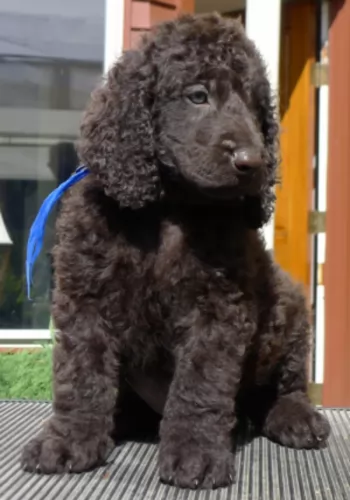 A peculiar feature of this dog is its hairless tail which is partly covered in curls which the rest is all but hairless, giving him the nickname of Rat Tail or Whip Tail.
A peculiar feature of this dog is its hairless tail which is partly covered in curls which the rest is all but hairless, giving him the nickname of Rat Tail or Whip Tail.
Looking much like a Poodle with his tight oily curls, the Irish Water Spaniel is a medium to large sized purebred dog, a robust, compact built dog with a skull which is shaped like a dome.
The muzzle is longish, the eyes dark brown and intelligent looking and the ears are long and floppy.
His hair is thick and curly and it sheds very little so that the dog is regarded as being hypoallergenic. The medium length coat is a dark brown, liver color with fairly tight curls that may even tend to cover the eyes.
It is interesting to note that he has webbed feet, which is useful for when the dog swims.He stands at roughly 51cm to 61cm and weighs between 25 to 30kg.
Temperament in any dog is affected by socialization and the way the human owner raises the dog. The Irish Water Spaniel is a water loving dog, being active and energetic.
He is an intelligent dog and easy to train and socialize. When trained he becomes such an obedient dog. He has also got a light-hearted side to him and is actually known to be quite amusing and clownish, providing plenty of laughs for you.
They make good family dogs, getting on well with children in the home as well as with other pets. They're also able to make good guard dogs, taking the protective roles seriously. He isn't an aggressive dog but he has a warning bark that can be a good warning to intruders.
 The medium to large Large Munsterlander stands between 60 to 65cm at the withers and weighs about 28 to 32kg.
The medium to large Large Munsterlander stands between 60 to 65cm at the withers and weighs about 28 to 32kg.
When you look at him, you get the feeling that you’re looking at a springer spaniel. He has long broad feathery ears and also a long feathery tail. The head is fairly broad and somewhat rounded.
The coat of the dog is long and dense, and is quite wavy with feathering around the legs and tail. He can be black and white or be a reddish brown with patches or ticking because of the piebald gene. If you allow your Large Munsterlander to become a parent, the average litter of this dog is 5 to 10 puppies.
The Large Munsterlander is essentially a tracking, retrieving dog. He makes an excellent hunting dog and these instincts are strong within this particular breed. It is why some breeders only give their puppies to serious hunters.
He is an active dog, and because he loves to retrieve, ball games will suit him down to the ground. Take him with you on your walks as he is a naturally athletic, active dog.
He loves water too and won’t need a second invitation from you to jump right into dams or pools. He is such an easy going dog, getting on well with children and pets in the home and being a good first choice for first time dog owners too. However, he requires plenty of exercise.
Because he is a hunting and retrieving dog, he will be far better suited to living in a home where there is a fair sized garden. He isn’t regarded as a city dwelling dog. These are dogs that just love to be outside and running around.
The Large Munsterlander can be a boisterous dog, so teaching him some basic commands such as ‘come, stay, lie-down, sit or heel’ will improve the way he behaves inside the home and when in the company of other people.
Training and socialization will do him the world of good and it means you can take your dog anywhere – he’ll always be well behaved, becoming a calm, gentle dog.
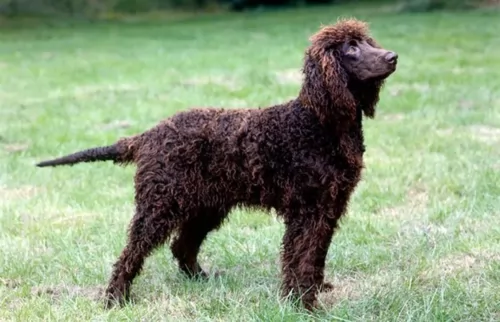 Your active Irish Water Spaniel just loves water so you can count him in whenever you go swimming. That is one characteristic of the Irish Water Spaniel – he just loves to be involved in all the action you're busy with.
Your active Irish Water Spaniel just loves water so you can count him in whenever you go swimming. That is one characteristic of the Irish Water Spaniel – he just loves to be involved in all the action you're busy with.
He makes an ideal family pet for an active family, and he will be a loyal and devoted pet who will provide a lot of fun to your family with his mischievous side.
He is confident, independent and strong willed so first time dog owners should bear this in mind. He is essentially just a fun loving, busy dog and if you make sure to exercise him well and make sure he is a participating member of your family, he'll be your most loving and devoted friend.
 As a sporting dog, the Large Munsterlander loves his exercise. You can involve him in all kinds of outdoor activities, and he’ll readily join in, from swimming, to hiking to ball games to just plain running for the fun of it.
As a sporting dog, the Large Munsterlander loves his exercise. You can involve him in all kinds of outdoor activities, and he’ll readily join in, from swimming, to hiking to ball games to just plain running for the fun of it.
Always be careful with puppies though, before you involve such a young dog with such strenuous exercise. For a better chance of avoiding hip dysplasia, it is better to wait till he is about 12 months old before you involve him in too many lively activities.
He’s an easily trainable dog too, and the fact that he is a calm, gentle dog who is loving and loyal makes him an excellent pet choice.
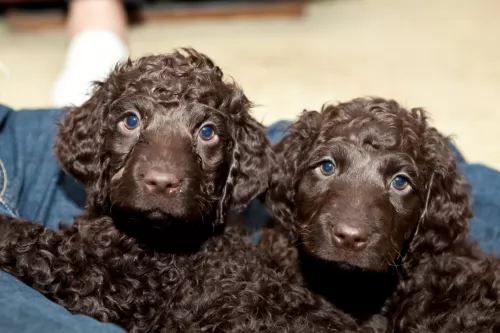 A generally healthy breed, the Irish Water Spaniel, just like with most other dogs, can fall prey to some of the more common dog ailments of which hip dysplasia is one.
A generally healthy breed, the Irish Water Spaniel, just like with most other dogs, can fall prey to some of the more common dog ailments of which hip dysplasia is one.
Bone and joint problems like this can lead to lameness even in young dogs.
Eye diseases are also a problem, and cataracts can form in the eye, particularly when the dog is older and create a cloudy look to the eye. It's not painful for the dog.
Hypothyroidism, a treatable hormonal disorder is another disease worth being aware of.
 All dogs can develop some health problems no matter how healthy they are, but when they are happy dogs, they’re well fed, exercised and loved, they have a better chance of reaching a ripe old age.
All dogs can develop some health problems no matter how healthy they are, but when they are happy dogs, they’re well fed, exercised and loved, they have a better chance of reaching a ripe old age.
Large Munsterlanders are generally healthy dogs. Some conditions reported in the breed which are highly unlikely to affect your dog, but are good knowing about are hip dysplasia, cataracts and osteochondrosis.
This is a common condition where the joints of quickly growing puppies are affected. The surface of the joint doesn’t convert into bone in certain areas. The result is thickened cartilage which detaches from the surrounding normal cartilage, forming a flap.
Osteochondrosis causes the development of osteoarthritis, affecting certain joints of the dog. Both genetics and the wrong diet are causes of osteochondrosis.
It isn’t always possible to feed your dog wholesome food, but always try to get the very best quality food there is. Also, don’t allow your young Large Munsterlander to be involved in strenuous exercise before he reaches one year of age. Pounding around can put abnormal weight on the joints which can spell problems when the dog is older. Osteochondrosis mostly affects large and giant breed dogs.
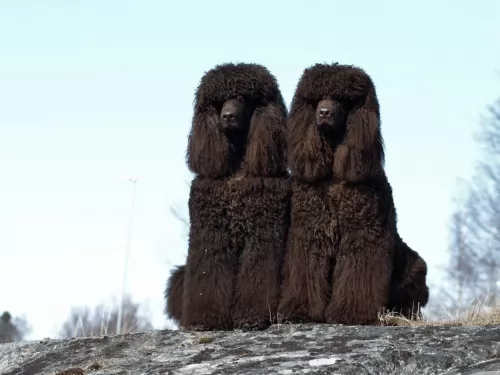 Your Irish Water Spaniel requires quite a bit of grooming that will involve his coat, his nails, his teeth and his ears. The double coat doesn't shed much so it can be easily maintained by brushing the coat twice a week.
Your Irish Water Spaniel requires quite a bit of grooming that will involve his coat, his nails, his teeth and his ears. The double coat doesn't shed much so it can be easily maintained by brushing the coat twice a week.
It can help your water spaniel to look good by sending him in to a doggy grooming parlor to have his curls neatened. This is a dog that loves water and swimming, and you will need to check the inside of his ears for dampness, wax build-up and debris. This can all combine to cause nasty ear infections.
The dog is energetic and will need to be exercised. Take him for walks, play ball games with him and allow him to go on hikes with you or to go swimming. He loves being involved in all your activities as he is a social, active dog.
Highly energetic, it will be important to feed your Irish Water Spaniel with food that enhances his energy levels. There are some good quality commercially manufactured dog foods on the market. Choose one that caters for active, athletic dogs such as the Irish Water Spaniel.
Dry kibble is more recommended to prevent canine tooth decay. Mix in some home cooked foods from time to time such as cooked chicken, rice, pasta and vegetables and try to include some raw meat every now and then as well. Make sure he has constant access to fresh, cool water.
 The Large Munsterlander puppy will require 4 meals a day. When he reaches a year of age, you can give him two smaller meals a day.
The Large Munsterlander puppy will require 4 meals a day. When he reaches a year of age, you can give him two smaller meals a day.
He is a large, active dog and if you feed him manufactured dog food, make sure its high quality and that it caters to his age and energy levels. His dry kibble can be mixed with cooked chicken, brown rice or pasta and cooked or raw vegetables occasionally.
Raw meat can be expensive, but every dog requires some raw meat in the diet every now and then. Without some raw meat, you dog may well suffer with skin problems and a dull coat.
If your dog is still an active hunting dog, a high fat, high protein diet will be good for him. When in any kind of doubt, speak to a dog expert or your vet about how to feed him for health and longevity.
As a sporting hunting dog, the Large Munsterlander has high exercise needs. He most certainly won’t do well in a tiny city garden as he is an outdoor dog wanting to be running and exercising. If you choose this particular dog breed, make sure that you take him on walks, allow him off his leash in the park, play ball games with him and take him with you when you go on hikes.
With his silky coat, you want to be brushing your pet twice a week. If he has been out hunting with you, while brushing him, check for twigs, grass and burrs tangled in the hair.
Other basic care includes trimming the nails, keeping the ears clean and dry inside, brushing the teeth with a canine-approved pet toothpaste and toothbrush for good overall health.